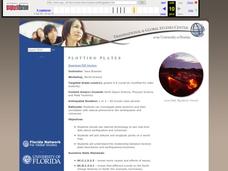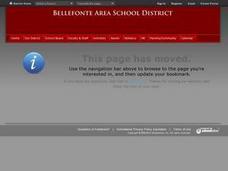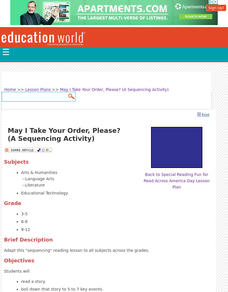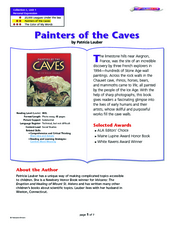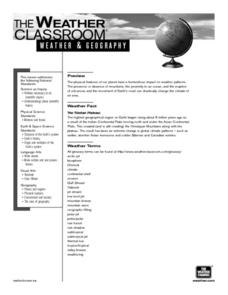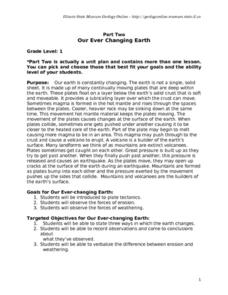Curated OER
Pass the Plate
Young scholars define constructive forces. They describe how landforms are created as a result of constructive forces. Students recognize active volcano areas in the United States. They demonstrate an understanding of Panagea.
Curated OER
A Place in Time
Young scholars become familiar with an eruptive history and related world events and impart a sense of the immensity of geological time. They explore timelines by creating their own, then are introduced to major eruptive periods of Mount...
Curated OER
About to Explode
Students explore Mount St. Helens' quiet eruption of 2004-2005. They examine different types of eruptions and then present creative first-hand accounts of different volcanic eruptions in history.
Curated OER
Plotting Plates
Students investigate plate tectonics and their correlation with natural phenomena like earthquakes and volcanoes. They use the internet to see real-time data about earthquakes and volcanoes. Students plot latitude and longitude points on...
Curated OER
Fallout!
High schoolers plot the locations of fallout from two disasters that polluted much of the world's air. They plot the ash fallout from the 1980 Mt. St. Helen's eruption to see what the wind patterns in the United States look like overall....
Curated OER
Volcanic Wrath
Students observe volcanic action using an internet Web site of satellite photographs. Stuents create a portfolio of observable features.
Curated OER
Using My Nasa Data To Determine Volcanic Activity
Learners use NASA satellite data of optical depth as a tool to determine volcanic activity on Reunion Island during 2000-2001. They access the data and utilize Excel to create a graph that has optical depth as a function of time for the...
Curated OER
Look at Those Leaves!
Students observe leaves. In this math and science cross-curriculum leaf lesson, students take a nature walk and collect leaves. Attributes are assigned and leaves are sorted in various ways. Students use non-standard or standard units of...
Curated OER
Sculptors of the Earth
Students observe evidence of erosion and various rock formations that have formed as a result of erosion and weathering. Their task is to explain how the forces of weathering and erosion contributed to sculpturing these rocks into arches...
Curated OER
Language Arts: Inside, Outside, Upside Down
Students create a computer slide show of pictures representing directional words. After listening to several books with examples, they pair words such as inside and outside, below and above, or high and low. With older students or...
Curated OER
Pollution Search
First graders identify forms of pollution and describe effects that various pollutants can have on people, wildlife, and plants; students describe relationships between various forms of pollution and human actions.
Curated OER
May I Take Your Order, Please?
Pupils read a story, boil down that story to 5 to 7 key events, create a sequencing quiz to go with the story and have their classmates take the quiz. They will the strategy of sequencing by reading various stories (that they are not...
Curated OER
Painter of the Caves
What a great lesson! Learners read a story called Painters of the Caves by Patricia Lauber which discusses Stone Age wall paintings in Avignon, France. There is a series of discussion questions, comprehension questions, and a graphic...
Curated OER
Using MY NASA DATA to Determine Volcanic Activity
Students explore how aerosols are used in science to indicate volcanic activity and how biomass burning affects global aerosol activity. Students access data and import into MS Excel using graphical data to make inferences and draw...
Curated OER
Building for the Big One
Students build and test structures that can best withstand earthquakes. They create their structures from playdough, cornstarch, grape-nuts and popsicle sticks and place their structures on a "shake table."
Curated OER
The Tibetan Plateau
Learners discuss the characteristics of the biosphere, with a focus on the Tibetan Plateau. They participate in a question and answer period discussing biomes and climate patterns. They compare and contrast different ecosystems.
Curated OER
The Scientific Method, Blood Typing, and Antibiotic Resistance
Students are given some components of an experiment, where they are able to identify and fill in missing parts, such as hypothesis, conclusion, results, etc. They form a hypothesis given general scientific facts. Students apply the...
Southern Nevada Regional Professional Development Program
Pardon Me, Your Modifier is Dangling
Lost! (or misplaced) a modifier. Last seen dangling at the end of a sentence! Reward offered! To underscore the humor, class members are each given a sample sentence to illustrate (A woman passed by, leading a Springer Spaniel, in a...
California Academy of Science
Coincidental Colonization
The Galápagos Islands are an amazing place of isolated adaptation, colonized by an interesting mix of plants and animals. The class plays a game to help them understand how these organisms came to live on the island through a combination...
Virginia Department of Education
Succession
The final lesson in a two-part series prompts scholars to create newspaper articles and succession events. Applying their knowledge of the ecosystem and the past examples of succession, they predict what will happen in the future...
NOAA
Exploring Potential Human Impacts
Arctic sea ice reflects 80 percent of sunlight, striking it back into space; with sea ice melting, the world's oceans become warmer, which furthers global warming. These activities explore how humans are impacting ecosystems around the...
Curated OER
Looking Back to 1980
Students use clustering/mind mapping techniques to generate ideas, graphically represent inferences, organize their conclusions and write a report that presents conclusions the writer has reached, and facts substantiating those conclusions.
Curated OER
Rock Crystallization
Students determine the differences between the crystallization of igneous and metamorphic rocks. They examine both liquid state and solid state crystallization.
Curated OER
Our Ever Changing Earth
First graders study ways in which the earth changes due to erosion and weathering in this series of lessons.



